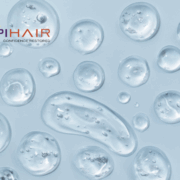HPIHair: Peptide Therapy for Celiac Disease and Hair Regrowth
Oxford University Peptide Therapy For Celiac Disease
At HPIHair in Nashville, we offer personalized, physician-supported solutions rooted in science to help you address the underlying causes of hair loss. Our team of trichologists and hair loss specialists work with you to develop a clinically-based, individualized treatment plan tailored to your unique needs, whether you’re in the early stages of hair loss or seeking full restoration. With over 30 years of success in helping people regrow their hair, it’s no wonder that physicians trust us with their patients’ care. One promising option we offer is peptide therapy, a rapidly developing field that uses specific peptidesshort chains of amino acidsto potentially influence biological processes like tissue repair, immune function, and overall wellness. Though peptide therapy shows promise in supporting hair regrowth, individual results can vary, so it’s essential to consult with healthcare professionals to determine how this treatment may align with your personal health goals. Experience the power of hair science for yourselfget started on your journey today.
Peptide Therapy for Celiac Disease: A Modern Approach and Outlook
———————————————————
Peptide therapy for celiac disease is an innovative approach that opens the doors to new possibilities for managing the condition. Consider the following advantages and disadvantages of peptide therapy in addressing celiac disease.
Pros of Peptide Therapy for Celiac Disease:
– Targeted Treatment: Peptides can be designed to specifically target and address the underlying causes of celiac disease, potentially leading to more effective treatment outcomes.
– Improved Tolerance: Peptide therapy may aid in improving tolerance to gluten, providing celiac disease patients with the opportunity to consume certain gluten-containing foods without experiencing adverse effects.
– Reduced Inflammation: Certain peptides may possess anti-inflammatory properties, potentially contributing to the reduction of intestinal inflammation associated with celiac disease.
– Promising Research: Ongoing research and developments in the field of peptide therapy offer hope for enhanced management of celiac disease, with potential future breakthroughs on the horizon.
Cons of Peptide Therapy for Celiac Disease:
– Individual Variability: As with many medical treatments, the response to peptide therapy can vary among individuals, leading to differing outcomes and experiences.
– Availability and Accessibility: Access to peptide therapy for celiac disease may be limited, requiring patients to seek specialized healthcare providers or research facilities for treatment.
– Regulatory Considerations: The regulatory landscape surrounding peptide therapy for celiac disease may still be evolving, necessitating thorough assessment of the treatment’s safety and efficacy.
– Cost Implications: Peptide therapy may entail significant costs, which could impact its accessibility and affordability for certain individuals.
Peptide Therapy for Hair Regrowth: Exploring the Potential
————————————————————
In addition to its applications in addressing celiac disease, peptide therapy has shown promise in the realm of hair regrowth. Here are some key points to consider when exploring peptide therapy for hair regrowth.
Pros of Peptide Therapy for Hair Regrowth:
– Stimulates Hair Follicles: Certain peptides have been studied for their ability to stimulate hair follicles, potentially promoting the growth of new, healthy hair.
– Supports Hair Health: Peptide therapy may contribute to overall hair health, addressing factors such as hair thinning, scalp conditions, and hair texture.
– Minimally Invasive: Compared to some traditional hair restoration methods, peptide therapy is minimally invasive, offering a more comfortable and convenient treatment experience.
– Personalized Approach: Peptide therapy can be tailored to individual needs, allowing for a customized treatment plan that aligns with specific hair regrowth goals.
Cons of Peptide Therapy for Hair Regrowth:
– Varied Results: While peptide therapy has demonstrated efficacy for many individuals, results can vary based on factors such as the underlying cause of hair loss and individual response to treatment.
– Treatment Duration: Achieving optimal results with peptide therapy may require ongoing treatment sessions over a period of time, demanding commitment and patience from individuals seeking hair regrowth.
– Cost Considerations: The cost of peptide therapy for hair regrowth may factor into the decision-making process for some individuals, prompting a thorough evaluation of potential benefits versus financial investment.
– Adjunctive Measures: Peptide therapy for hair regrowth may be more effective when combined with complementary treatments or lifestyle modifications, necessitating a comprehensive approach to addressing hair loss.
Embarking on Your Peptide Therapy Journey: Schedule Your Session Today
————————————————————–
Take the first step toward discovering the transformative potential of peptide therapy for celiac disease and hair regrowth. Our team at HPIHair is dedicated to guiding you through an enlightening journey toward improved wellness and confidence. Contact us to schedule a consultation and embark on a personalized path toward fulfilling your health and beauty goals.














